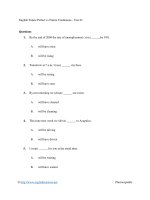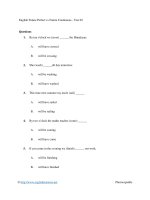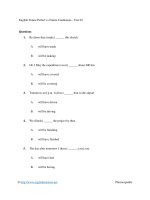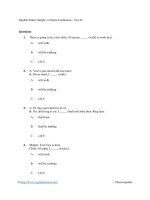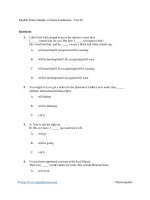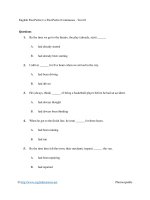ENGLISH PAGE indefinite vs definite articles a(an) vs
Bạn đang xem bản rút gọn của tài liệu. Xem và tải ngay bản đầy đủ của tài liệu tại đây (152.81 KB, 3 trang )
englishpage.com
Home > Articles Tutorial > A(An) vs. The
A(An) vs. The
f
t
g+
p
USE 9
A and AN are called indefinite articles. "Indefinite" means "not specific". Use A(AN) when
you are talking about a thing in general, NOT a specific thing.
Examples:
I need a phone. Not a specific phone, any phone
Mark wants a bicycle. Not a particular bicycle, a bicycle in general
Do you have a driver's license? In general
Use A(AN) when talking about a thing which is new, unknown, or introduced to a listener for
the first time. Also use A(AN) when you are asking about the existence of something.
Examples:
I have a car. The car is being introduced for the first time.
Tom is a teacher. This is new information to the listener.
Is there a dictionary in your backpack? Asking about the existence of the dictionary
Similarly, use A(AN) to introduce what type of thing we are talking about.
Examples:
That is an excellent book. Describing the kind of book
Do you live in a big house? Asking about the kind of house
I ate a thick, juicy steak. Describing the kind of steak
REMEMBER: You cannot use A(AN) with plural nouns because A(AN) means "one" or "a
single".
Examples:
I saw a bears in Yellowstone National Park. Not Correct
I saw bears in Yellowstone National Park. Correct
/>
1/3
USE 10
THE is called a definite article. "Definite" means "specific". Use THE when talking about
something which is already known to the listener or which has been previously mentioned,
introduced, or discussed.
Examples:
I have a cat. The cat is black.
There is a book in my backpack. The book is very heavy.
Do you know where I left the car keys? The listener knows which specific car keys you
are talking about.
Do you own a car? Is the car blue? You assume they do have a car after asking about
it in the first sentence.
Nobody lives on the Moon. The Moon is known to everyone.
IMPORTANT: You can use THE with both singular nouns and plural nouns.
Examples:
I saw the bear in Yellowstone National Park. Correct
I saw the bears in Yellowstone National Park. Correct
USE 11
Many clauses and phrases make the noun known to the listener by telling the listener which
person or thing we are talking about. Let's look at an example sentence:
Can you give me the book on the table.
We use THE in this sentence because the phrase "on the table" tells the listener which book
we are referring to. We are not talking about other books, we are talking about a specific
book that the listener can see or already knows about. Learning to recognize such
identifying clauses and phrases will help you use THE correctly.
Examples:
Did you read the book which I gave you?
He didn't like the movie that you suggested.
He loved the dessert with chocolate and cherries.
The phone on my desk belongs to Ken.
Did you know the man who was talking to Leonie?
HOWEVER: Not all clauses and phrases make the noun known to the listener. Some are
/>
2/3
simply descriptive. They add extra information, but they do not tell the listener which specific
thing we are talking about.
Examples:
He bought the house with a big backyard. This combination tells the listener which
specific house he bought.
He bought a house with a big backyard. This combination tells the listener what kind of
house he bought, but not the specific house he bought.
Exercises Based on Uses 1 11
Articles Exercise 7 Uses 9 10
Articles Exercise 8 Uses 9 10
Articles Exercise 9 Use 11
Articles Exercise 10 Uses 1 11
Articles Exercise 11 Uses 1 11
Back to Part 1 A vs. An
Continue to Part 3 Advanced Article Usage
Copyright © 2016 Englishpage.com, All Rights Reserved.
Contact us | Privacy Policy | Advertise with us
Your personal online English school. Learn English at Englishpage.com!
Weekly Lesson Grammar Book Vocabulary Verb Tenses Conditionals Modals
Gerunds / Infinitives Articles Prepositions Minitutorials Irregular Verbs Reading Room
Listening Lounge Games English Forums English Schools English · Foreign Dictionaries
English ·English Dictionaries Irregular Verb Dictionary Phrasal Verb Dictionary
Verb + Preposition Dictionary
/>
3/3

